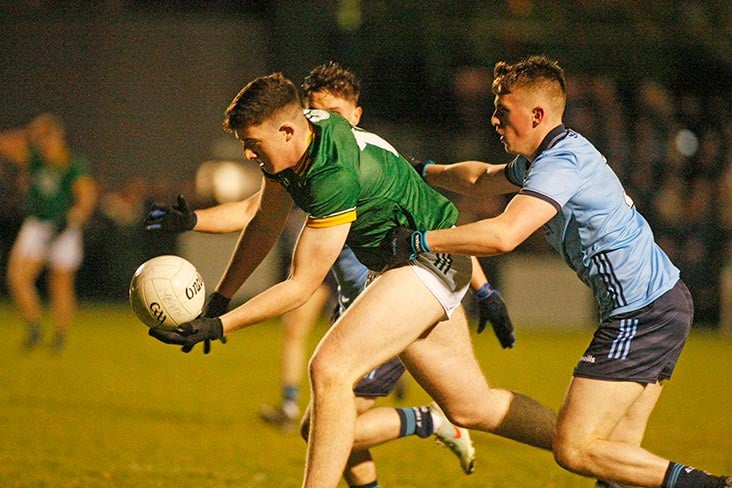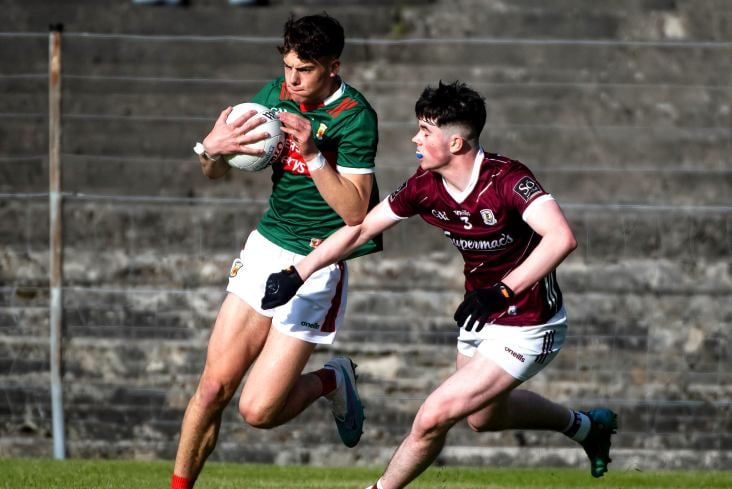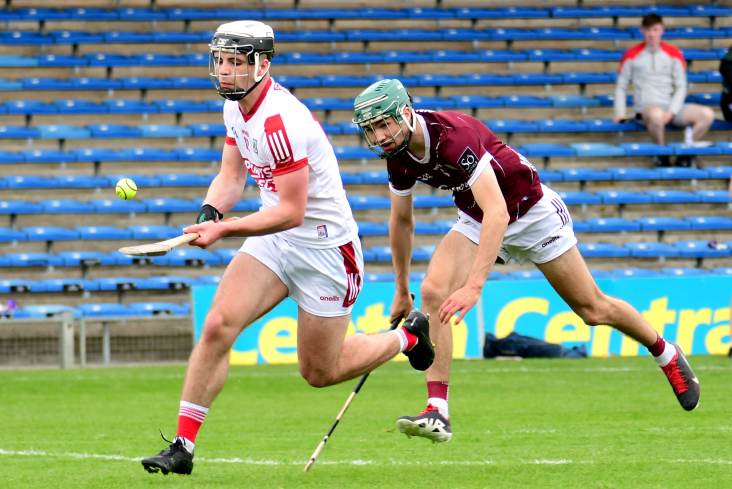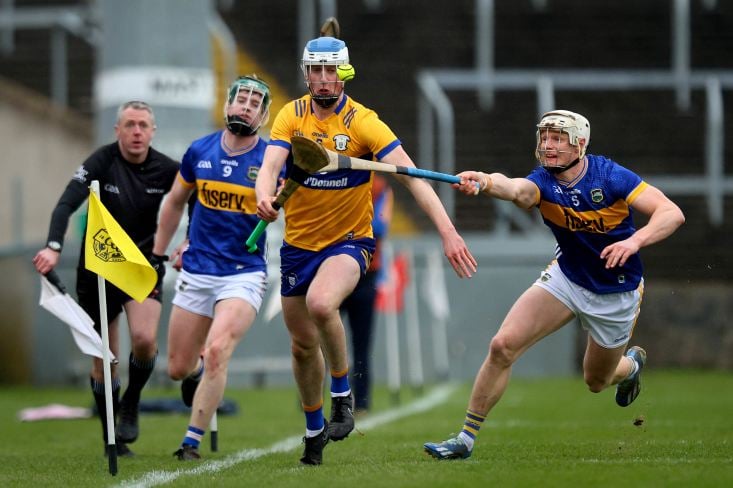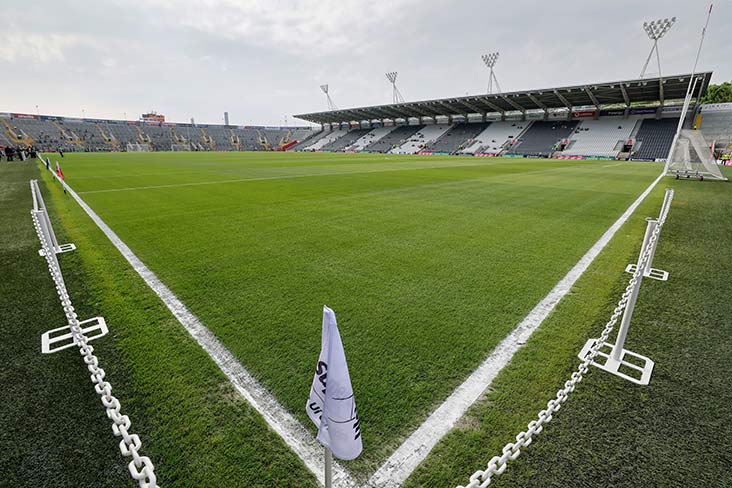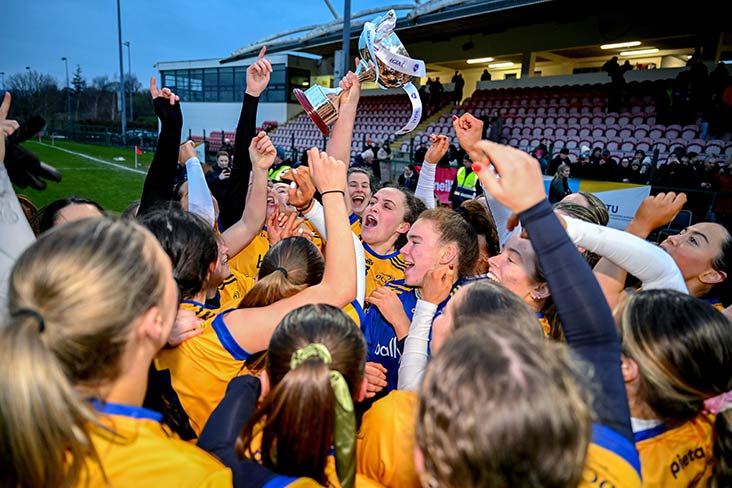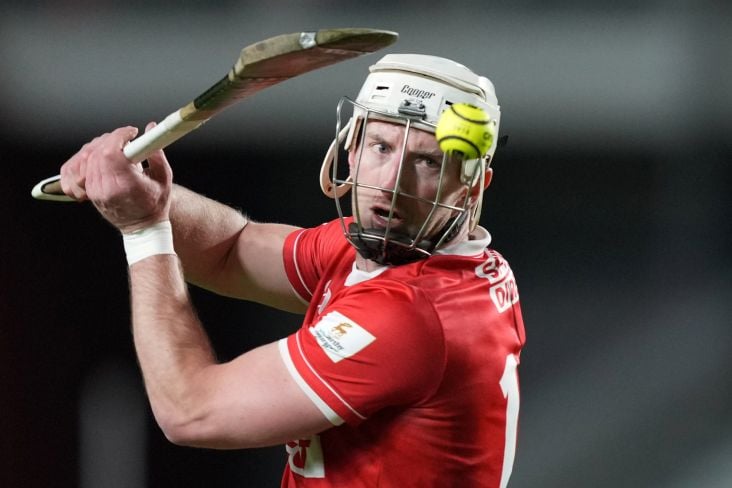GAA propose to scrap All-Ireland SFC quarter-finals and introduce group stage
August 04, 2016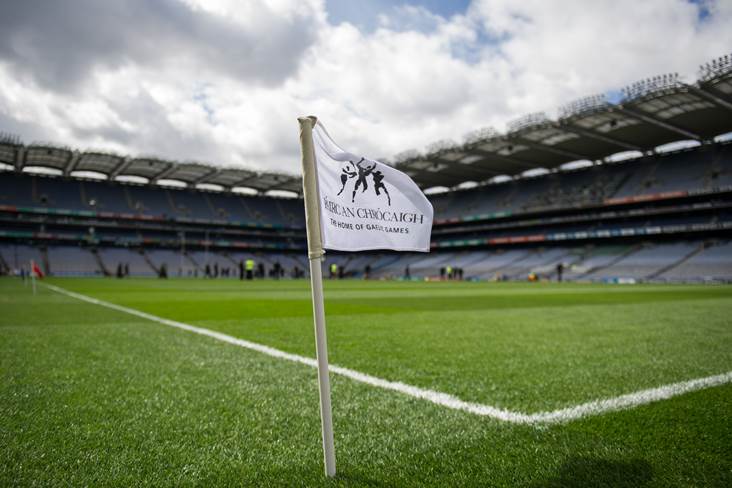
Croke Park Stadium.
©INPHO/Tommy Grealy.
The GAA have announced proposed changes to the All-Ireland senior football championship - including plans to scrap the competition's quarter-finals and introduce a group stage.
The four knockout games would be replaced with two groups of four competing in a round-robin competition to reach the semi-finals. The provincial and qualifier stages would run unchanged - although replays are would be outright abolished.
Under the Ard Stiúrthoir's proposal, the format of the All-Ireland senior football championship would be as follows:
Provincial championships
Knock-out format as at present.
All-Ireland qualifier series
Round 1: Sixteen teams that do not qualify for provincial semi-finals
Round 2: Eight round 1 winners play eight defeated provincial semi-finalists
Round 3: Eight round 2 winners play each other on an open-draw basis
Round 4: Four round 3 winners play four provincial runners-up
Proposal 1:
(i) A Division 3 or 4 team drawn against a Division 1 or 2 team in rounds one, two or three of the qualifiers will be granted an automatic home-venue advantage.
(ii) The format of 'A' and 'B' sides to the qualifier draw will be ended.
Quarter-final stage
Proposal 2:
The current quarter-final stage of the championship to be replaced by a Group Stage, contested by the four provincial champions and the four round 4 qualifier winners.
The group stage will be organised on a league basis with two groups of four teams, with each team playing the other three teams once.
After the group stage is completed the top two teams in each group will progress to the All-Ireland semi-final with the Group 1 winner playing the Group 2 runner-up and the Group 2 winner playing the Group 1 runner-up
Order of fixtures in both groups
Round 1
Team 1 v Team 2. Croke Park
Team 3 v Team 4. Croke Park
Round 2
Team 1 v Team 3 or 4. Home advantage for provincial champions.
Team 2 V Team 3 or 4. Home advantage for provincial champions.
Round 3
Team 1 v Team 3 or 4. Home advantage for Team 3 or 4.
Team 2 v Team 3 or 4. Home advantage for Team 3 or 4.
Note:
Home venues shall be subject to approval by the Central Competitions Control Committee (CCCC) and shall meet the criteria set down by the National Facilities/Health and Safety Committee. CCCC shall make the draws for Rounds 2 and 3.
The above fixtures format for the group stage means that each team will have one game in Croke Park, one home game and one away game.
Tie-breakers in the event of teams finishing level on points (in order of application):
(i) Result of game between two tied teams (only where two teams are level on points)
(ii) Score difference
(iii) Highest score for
(iv) Goals scored
(v) Play-off match
All-Ireland semi-finals
Group 1 winner v Group 2 runner-up
Group 2 winner v Group 1 runner-up
(to be played over one weekend)
The Proposal on the format of the All-Ireland Senior Football Championship in full
At Congress 2016 the Association addressed the issues of player overtraining and burnout, the structure of the All-Ireland senior football championship and a fixtures calendar that does not provide club players with a fair schedule of games. Progress was made on improving the situation on overtraining and burnout, but the structure of the football championship and our calendar of games remain unresolved problems. We must, therefore, continue to seek solutions to these twin dilemmas. This may take some time to achieve, but these are pressing matters. Our club players need a fairer schedule of games, and we must not let up in our efforts to achieve this. Our championship structure is regularly called into question, although it has not yet been possible to find general agreement on a new structure.
It may well be the case that there will not be a 'magic-bullet' solution to either problem, and that the necessary structural reforms will occur on an incremental basis. Indeed, given the democratic nature of the decision-making processes of the Association and the great variance in opinion about the best solutions to be adopted, it could well be more productive to seek to find agreement now on more modest reforms than to do nothing in the hope that agreement on comprehensive restructuring can be found. It is in this spirit that the present proposal to make adjustments to the All-Ireland senior football championship is offered.
The All-Ireland Senior Football Championship: The Current Structure
The current structure of provincial championships and All-Ireland qualifiers, in operation since 2001, is well embedded, respects tradition, and provides to every county a second-chance match and pathways for continuing progression. Yet it has obvious drawbacks, most obviously an unhealthy predictability about the outcome in two of the provincial championships: Dublin has won eleven of the last twelve Leinster titles, while either Kerry or Cork has won every Munster senior championship in the past 80 years with the exception of Clare's win in 1992.
It is often argued that the qualifier system has been to the benefit of the traditionally stronger counties, but it is also the case that the strongest counties are liable to qualify for the closing stages of the All-Ireland championship, as the best teams usually do in any sporting competition. And the argument about an in-built bias towards stronger counties does not adequately acknowledge the advantages of the qualifiers: they produce novel pairings, and they have allowed a number of traditionally less strong counties to reach an All-Ireland quarter-final. For many counties, the qualifiers are the route to a big day in Croke Park that they would never otherwise experience. Tipperary footballers have just offered us the most thrilling proof of how the qualifiers can also favour less traditionally strong football counties.
In 2015 An Coiste Bainistíochta invited counties' submissions on a revised structure for the All-Ireland senior football championship. It did so for three reasons: (i) a persistent criticism from some that the current championship format had grown lacklustre; (ii) the reality that there are some counties that cannot realistically aspire to winning either a provincial or an All-Ireland title; (iii) the incidence of one-sided games.
The debate on the An Coiste Bainistíochta initiative allowed a number of conclusions to be reached. These - along with the imperative to support our clubs - translate into the following constraints, within which we must seek solutions to any reform of the championship structure:
- the needs of clubs must be taken into account;
- there is no consensus on how the present championship model might be improved;
- counties want the provincial championships to be retained;
- counties demand a second-chance game;
- the so-called less successful counties have no interest in taking part in a second-tier competition.
Medium-term reform of the All-Ireland Championship Structure
In light of the An Coiste Bainistíochta initiative, it is clear that the options for immediate radical and comprehensive change are quite limited. The proposal outlined in this document seeks to present a modest adjustment to the championship format that would produce a more exciting senior football championship within the current provincial championship structure and in a way that should not have a negative impact on the playing of county club championships.
It will be seen that this proposal adds eight extra matches to the provincial and All-Ireland senior football championship programme. However, when one allows for the abolition of the Allianz League semi-finals, the increase in the overall annual inter-county senior football programme is reduced to six matches. And, as can be seen below in a separate section, tighter scheduling and a revised policy on replays can bring improvements to the situations that affect the scheduling of club fixtures and the availability of inter-county players to clubs.
PROPOSAL
Under this proposal, the format of the All-Ireland senior football championship would be as follows:
PROVINCIAL CHAMPIONSHIPS: Knock-out format as at present.
ALL-IRELAND QUALIFER SERIES
Round 1 Sixteen teams that do not qualify for provincial semi-finals
Round 2 Eight round 1 winners play eight defeated provincial semi-finalists
Round 3 Eight round 2 winners play each other on an open-draw basis
Round 4 Four round 3 winners play four provincial runners-up
Proposal 1:
- A Division 3 or 4 team drawn against a Division 1 or 2 team in rounds one, two or three of the qualifiers will be granted an automatic home-venue advantage.
- The format of 'A' and 'B' sides to the qualifier draw will be ended.
QUARTER-FINAL STAGE
Proposal 2:
The current quarter-final stage of the championship to be replaced by a Group Stage, contested by the four provincial champions and the four round 4 qualifier winners.
The group stage will be organised on a league basis with two groups of four teams, with each team playing the other three teams once. (See below for tie-breaking devices.)
Year 1 groupings (succeeding years could be based a rota system):
|
Group 1 |
Group 2 |
|
Team 1: Munster provincial winner |
Team 1: Ulster provincial winner |
|
Team 2: Connacht provincial winner |
Team 2: Leinster provincial winner |
|
Team 3: Ulster runner-up, or team that defeats them in round 4 |
Team 3: Munster runner-up, or team that defeats them in round 4 |
|
Team 4: Leinster runner-up, or team that defeats them in round 4 |
Team 4: Connacht runner-up, or team that defeats them in round 4 |
Order of fixtures in both groups
Round 1
Team 1 v Team 2. Croke Park
Team 3 v Team 4. Croke Park
Round 2
Team 1 v Team 3 or 4. Home advantage for provincial champions.
Team 2 V Team 3 or 4. Home advantage for provincial champions.
Round 3
Team 1 v Team 3 or 4. Home advantage for Team 3 or 4.
Team 2 v Team 3 or 4. Home advantage for Team 3 or 4.
Note:
Home venues shall be subject to approval by the Central Competitions Control Committee (CCCC) and shall meet the criteria set down by the National Facilities/Health and Safety Committee. CCCC shall make the draws for Rounds 2 and 3.
The above fixtures format for the group stage means that each team will have one game in Croke Park, one home game and one away game.
Tie-breakers in the event of teams finishing level on points (in order of application):
(i) Result of game between two tied teams (only where two teams are level on points) (ii) Score difference
- Highest score for
- Goals scored
- Play-off match
All-IRELAND SEMI-FINALS:
Group 1 winner v Group 2 runner-up
Group 2 winner v Group 1 runner-up
(to be played over one weekend)
All-IRELAND FINAL
Advantages of proposed structure
- It would provide a valuable enhancement of the championship by way of eight additional competitive matches contested by the country's eight best teams. The group games would increase interest at the peak of the GAA season and provide a much wider opportunity for the country's best teams to display their skills and the qualities of Gaelic football in summer playing conditions.
- The new structure would provide a more exacting pathway to the All-Ireland final: the finalists will have had to compete with three of the best teams in the country at the group stage, followed by a semi-final with a top-four team that came through the same test. This will have the effect of ensuring that the finalists will have been equally tested and that the two best teams in the country contest the All-Ireland final.
- Playing All-Ireland semi-finals over one weekend would generate greater excitement.
- The new structure would retain the provincial championships in their present form and confirm their importance in the context of the All-Ireland championship.
- All teams would continue to participate in the provincial championships and AllIreland qualifiers.
- The new structure should bring an overall boost in championship attendances.
- While income from the new group stage could be expected to exceed the gate receipts generated currently by the quarter-finals structure, it would be important to introduce a generous low-price ticket policy for supporters and families attending the group games.
- The new structure should increase commercial and broadcast income from the AllIreland senior football championship. A significant proportion of this increase should be ring-fenced for development of our games in less successful counties.
- The new structure would guarantee eight additional major games at venues within the provinces, which is particularly important in the context of the Association's investment in stadiums other than Croke Park. In addition, the playing of decisive matches of the championship in provincial venues would counter the Dublin-centred bias of the current structure. It would also be likely to bring top teams to provincial venues that they would never otherwise visit in the championship.
- The traditionally less strong counties would be favoured by their being granted homevenue advantage in rounds one, two and three of the qualifiers. This would represent a significant benefit and encouragement to these counties and would provide them with attractive home fixtures.
Supporting clubs
- The fixtures schedule (see Appendix 1) demonstrates how, with minimal changes, the new proposed structure could have been played in 2016. This is not necessarily the best available schedule. It is simply based on eliminating the semi-finals in the Allianz Football League (which has already been agreed), bringing forward the finals of the Allianz Leagues (the football final by two weeks and the hurling final by one week), and, in the Ulster football championship, playing the preliminary game and one first round game on the same weekend. The schedule shows how the All-Ireland hurling final could have been played on 21 August. This is two weeks earlier than at present.
- It will be noted that the final round of games in the group stage, which eliminates four teams, would be played one week later than the last of the quarter-finals in the current structure. However, twenty-four teams would have been eliminated from the football championship by the third week in July. This is two weeks earlier than at present. This is a critical point, as it is much more beneficial for clubs to have their county players available to them in July and August. In the period between the end of the Allianz League and the beginning of the championship, county players are rarely available to their clubs; the only period when clubs can be guaranteed access to their county players is when the county team is eliminated from the championship.
- This proposed modification of the structure of the championship highlights once again the critical need to introduce comprehensive reform of our inter-county fixtures scheduling, but also the opportunities that exist to do so - there is clearly scope to further condense the fixtures schedule at both provincial and All-Ireland level by playing more games over a single weekend and by shortening the gaps between games. This would, in turn, redress the current imbalance between the amount of training and number of games. No re-structuring of the championship will be acceptable that does not contribute to a re-balancing of the inter-county fixtures schedule in favour of clubs.
- Extra time should be played in the event of a draw in all provincial and All-Ireland championship games. Only when teams are level after extra time should a replay take place. This change alone would have a very positive impact on the scheduling of both inter-county and club fixtures and would reduce the instances where counties are adversely affected by 'the six-day turnaround'.

